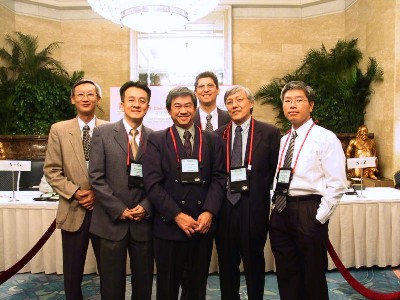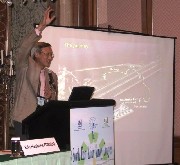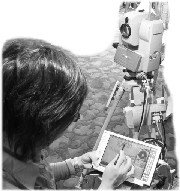7th
SOUTH EAST ASIAN SURVEY CONGRESS, Hong Kong
7th SOUTH
EAST ASIAN SURVEY CONGRESS, Hong Kong
3 – 8 November 2003
By Geoffrey Morris |
| |
|
| The recent 7th SEAS Congress in Hong
Kong brought together over 330 land
surveyors from 28 countries. The theme was
“From Compass and Pacing to Cyber
Spacing - How does SE Asian Surveying
Measure Up?” |
Delegates
to 7th SEAS CONGRESS included Loi Hwee
Yong, Soh Kheng Peng, Wee Soon Kiang,
Geoffrey Morris, Tang Tuck Kim and Martin
Ang |

Keynote addresses from
distinguished surveyors from Hong Kong,
China, Germany, Australia and New Zealand
and Malaysia challenged the congress
delegates to think about core issues –
such as seizing business opportunities,
embracing change, and making ourselves
more relevant to our client’s needs of
today.
One addressed the 24 year history of the
SEAS Congress which made us focus on
whether we had done “enough” to
encourage participation of the profession
amongst our developing nations. It was
suggested that the congress host country
work more closely with the ASEAN
Federation of Land Surveying And Geomatics
(ASEAN FLAG) to bring the congress to the
grassroots surveyors. This will be
embraced as an objective in the
forthcoming deliberations of ASEAN FLAG.
|
|
The Congress Director, Gordon Andreassand and
Congress Chairman T.N.Wong warmly welcomed the
Singapore delegation to the venue at Shangri-La
Hotel, Kowloon. Six SISV members attended -
Geoffrey Morris, (Vice President, LS Division),
Wee Soon Kiang (Singapore’s rep. to ASEAN FLAG),
Tang Tuck Kim, Martin Ang, Soh Kheng Peng and Loi
Hwee Yong. |
The Congress Director, Gordon Andreassand and
Congress Chairman T.N.Wong warmly welcomed the
Singapore delegation to the venue at Shangri-La
Hotel, Kowloon. Six SISV members attended -
Geoffrey Morris, (Vice President, LS Division),
Wee Soon Kiang (Singapore’s rep. to ASEAN FLAG),
Tang Tuck Kim, Martin Ang, Soh Kheng Peng and Loi
Hwee Yong. |
 |
Mr Loi presented a paper “Using Convergent
Digital Close Range Photogrammetry (DCRP) for
Documentation of Singapore’s Merlion”. This
new concept in using DCRP was very well received.
It offered substantial advantages when compared to
using traditional surveying techniques and even
rivaled the more expensive 3D laser scanning
techniques for object mapping.
His paper was one of over 80 papers delivered
on topics ranging from Atmospheric Refraction
Observations, Digital Craniofacial Databasing to
Hollywood Movie Surveyors and Volcanic Deformation
Monitoring using GPS.
|
| |
|
Other new technology launched at the congress
included the motorized video theodolite - remotely
operated by a single operator using wireless modem
and built-in video camera. Also on show was the
new generation PDA (electronic fieldbook) - the
digital equivalent to the traditional survey
fieldbook for recording measurements. Other papers
explained how Virtual Referencing Stations used
mobile phone connectivity for providing real-time
corrections for GPS surveying.
A number of interesting technical tours were
held between 8 - 10th November. They included
visits to the Lands Dept, Ma On Shan Rail Project,
The Cyberport & HK Planning &
Infrastructure Exhibition Gallery, and an Official
Visit to Macau Cartography and Cadastra Bureau.
|
 |
| |
|
|
| At the conclusion of the congress,
it was resolved that the 8th SEAS Congress be held
in New Zealand in 2007. However, to bring the
benefits of the congress closer to the developing
nations, it was decided that a mini-congress be
held in the region every two years. Brunei offered
to host the first mini-congress in 2005, under the
auspices of ASEAN FLAG.
It was also decided to form a committee
representing the professional land surveying
institutes from South East Asia to "develop a
proposal on the future roles and direction of SEAS
Congress”. This would be presented at the next
SEAS Congress in 2005
|
|
|
![]()